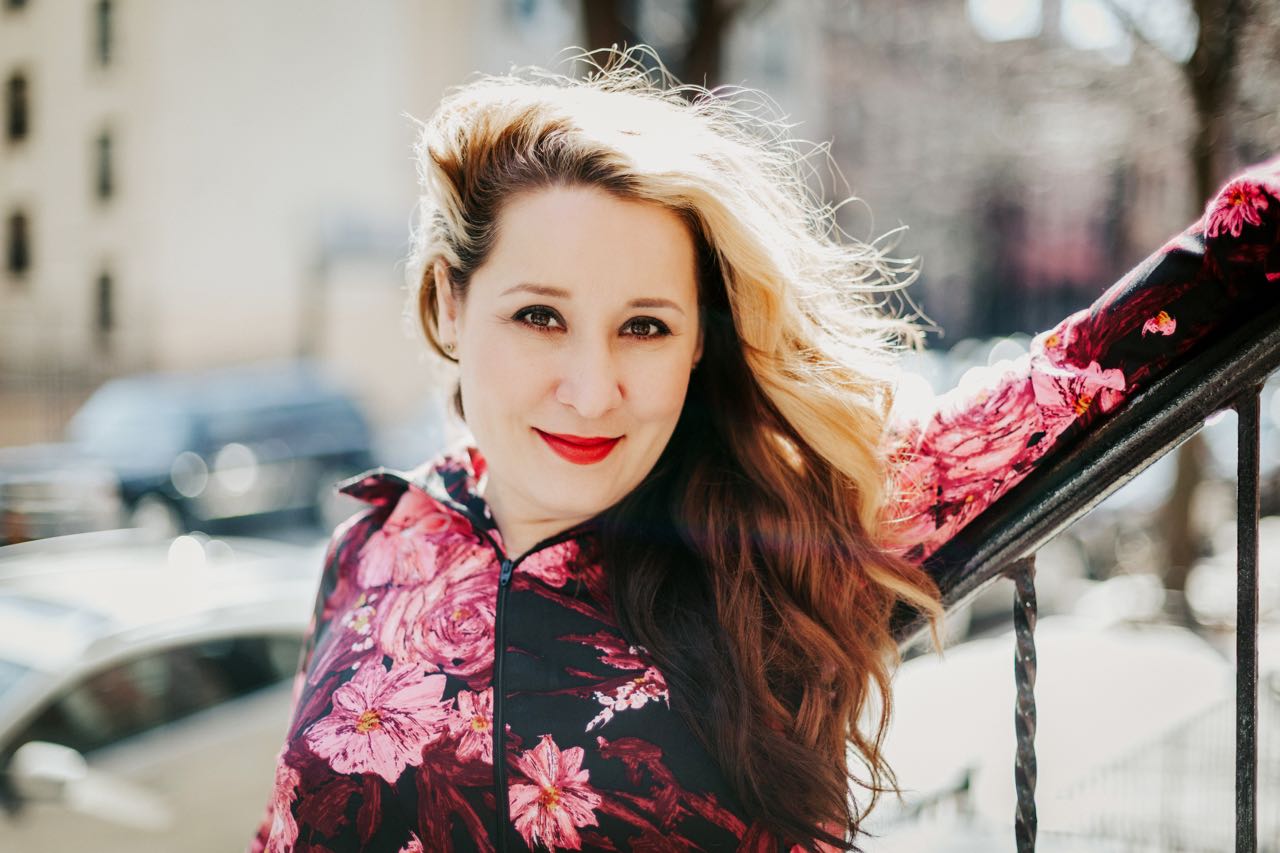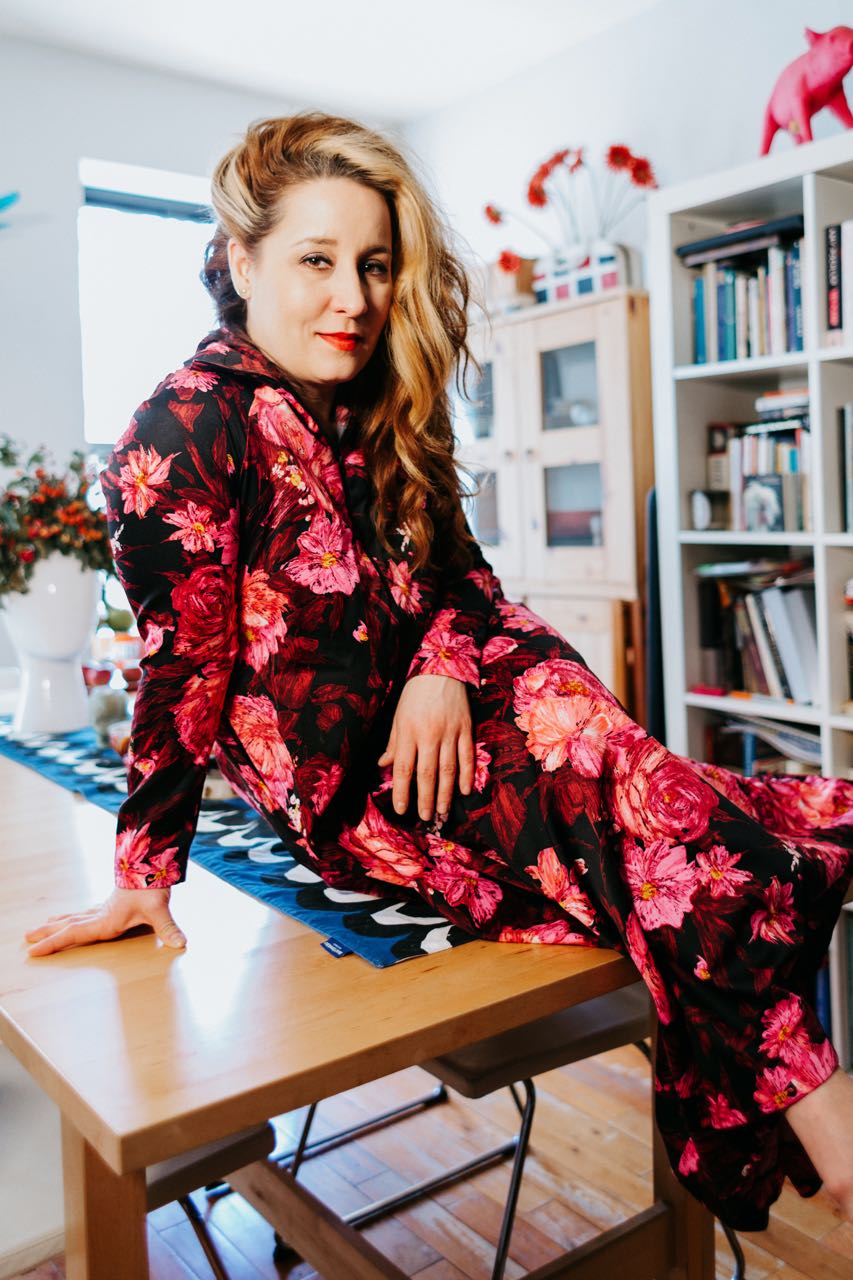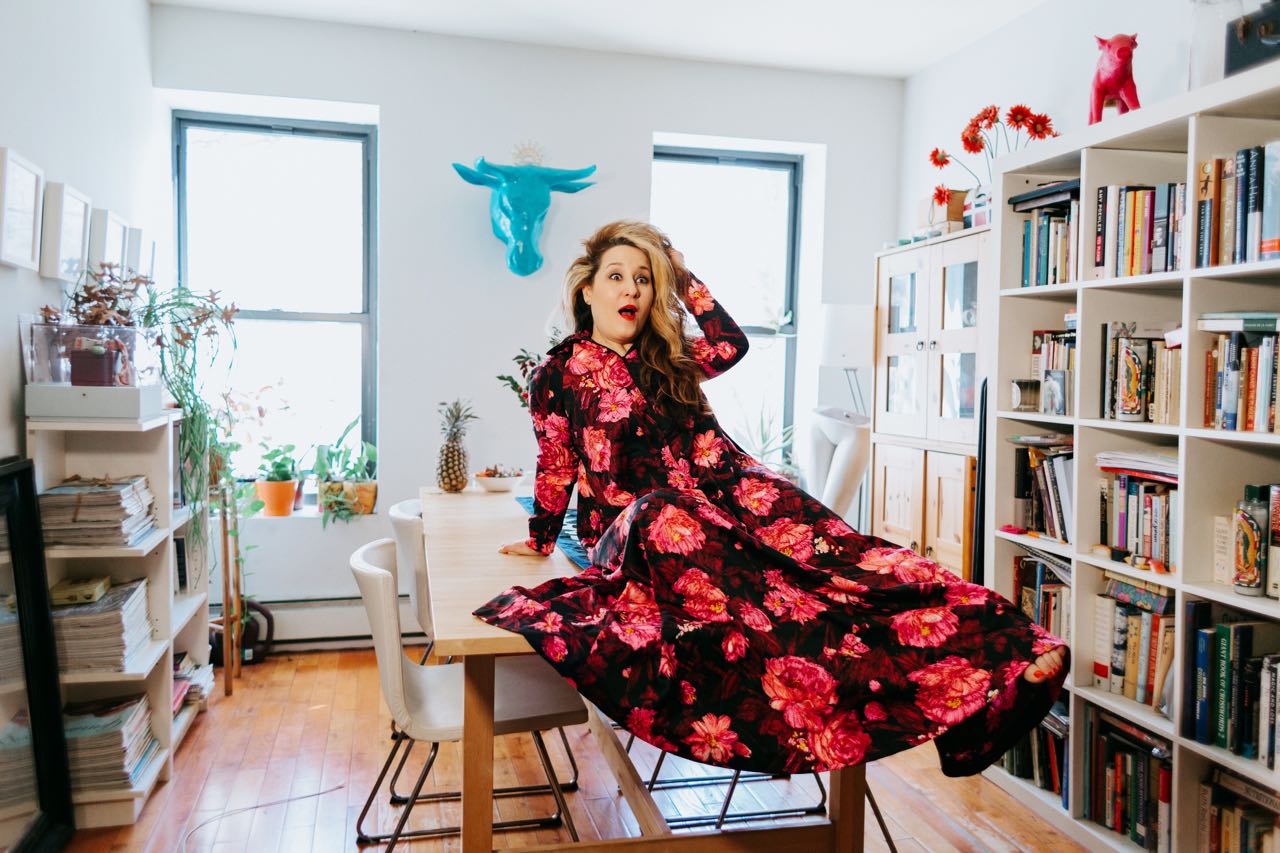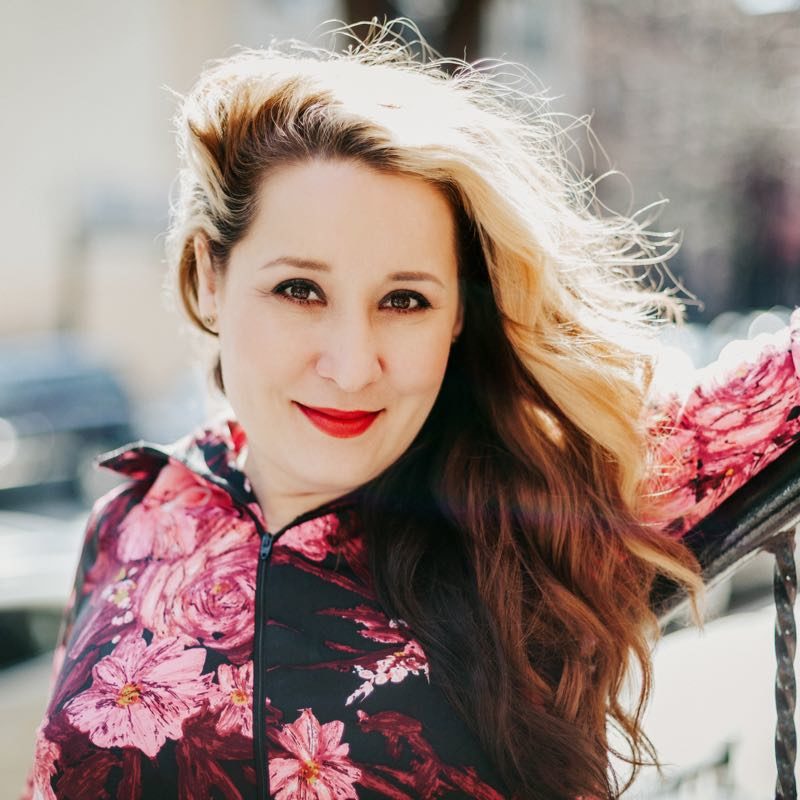Amanda Duarte on Staying Alive (her cabaret show, but also in the metaphysical sense)

March 27th, 2019
There is a homemade disco ball in the corner on a shelf in Amanda Duarte’s bedroom. It broke—one of the perils of a homemade disco ball—which led to Amanda picking a giant shard of glass out of her foot one night at 3am. These are the things that happen to her. She’s now turned elements of her life into a cabaret show, Amanda Duarte: Staying Alive at Joe’s Pub. The show (where, yes, the infamous song comes into play, as does the film starring Sylvester Stallone) chronicles her life after the end of her long term marriage, which coincided with the 2016 election and the end of democracy. In addition to writing and performing, Amanda is also one of the co-creators of the #PussyGrabsBack hashtag on Twitter. I recently spoke with her about her path to writing, writing from autobiography, the idea of “the good feminist,” and more.
How did you get into writing and performing your own work?
I started out as an actor and I worked in San Francisco for some years, and then I moved to New York. Pretty shortly after I moved to New York, I started writing for myself, because it was taking a while for me to crack into the acting world. I was bitching and moaning about how because of my physical type, because of my age, I’m usually cast as comic relief. I was the girl in college who always played the children and the old people. I was like, “I don’t feel like I’m getting called in for the kinds of things that I want to do,” and a friend was like, “Well, what kind of parts do you want to play? Just write them and play them. Why are you looking for permission from other people to play the parts that you want to play?” I was like, “You know, that’s a really good idea,” and so I started doing that.
At that time I was writing characters and solo sketch comedy, and I was doing a lot of improv. As time went on, I started doing storytelling, and from that, it grew into a different kind of writing style than I had ever done. I didn’t ever study writing in school. I was undergrad in acting at a state school, and basically just did drugs and had sex, so I didn’t have any real education in much of anything, but especially writing. Now I freelance for magazines, but I didn’t really start doing that until my mid-30s. And writing in the style that I’m writing in and performing like that, again, I didn’t really start doing that until my mid-30s. So it’s a relatively new thing for me, and I really like it a lot.
I’ve talked to a few people who started as actresses and started writing later, and it was always something they wanted to do but felt like they needed permission. In the back of your mind, was it always something you were interested in?
Yes. Absolutely. I remember writing really bad plays when I was in my early 20s. I remember writing really bad poetry. I don’t know that it was really bad, but that was what held me back from writing more at the time—I thought that everything I wrote was really bad. So I didn’t take it seriously, didn’t take myself seriously enough to keep doing it. And, especially as women writers, or really women anything, and especially my generation, we’re sort of farmed and wired to feel like we need approval to do what it is that we want to do. We need permission. We basically need daddy to tell us that it’s okay and that we’re good enough to do what we’re doing. That was hard enough for me as an actor. As a writer, I felt so undeserving and inexperienced, and I didn’t have the confidence to really, truly do it until relatively very recently.
In a way, I look back, and I’m like, “God, what I wouldn’t give to go back and have the—if not confidence, then just sort of the fuck-it attitude to just write and perform my own stuff starting a lot earlier.” But on the flip side, in a way, I wouldn’t change it, because I think it’s actually really exciting to know that, specifically with a writing career but really with anything, it’s never too late to start doing something you’ve always wanted to do, to start doing something new, to take on a new form, to learn a new skill creatively, and to sort of keep expanding in that way. It all came about for me at a time where I was finding myself starting to have that limited endpoint thinking, and just sort of saying fuck it. And also having a lot of encouragement from people who thought I was very good and encouraged me to keep going and keep writing. It came at a really useful time for me in terms of breaking out of that way of thinking about a lot of different things. It’s very easy to think, “Oh, I’m too old. It’s too late. I wasn’t famous by 24, so that means there’s nothing in the world for me. It’s all over. I might as well just learn to code.”
Was there any very specific moment that changed or propelled your thinking that way, or was it a number of things all coming together at once?
I want to talk specifically about this past year. Because I feel like I broke through a membrane in the past year or so, as a writer and as a performer, and a lot of it was that I got out of a marriage that was not good and that had affected my thinking about myself. I was not as courageous as I wanted to be, and when my marriage ended, I was sort of upside-down, mentally. Yet, in the middle of all of that, I knew that I wanted to write about everything that I was experiencing. I knew that I wanted to use this annihilation of most of the parts of my life. I knew that I wanted to use that as a springboard to what was next, and I knew that what I wanted to be next for me was to be a more productive writer, and a more fearless writer and a more helpful writer. And so I thought, “I think it would actually be helpful to other people who have been through what I’m going through.” All of us who are living in—I can’t believe I have to say this, it makes me sick every time—Trump’s America—especially women, it seems, are feeling very lost and very scared, and like we’ve all been betrayed. We’ve all been abandoned. We’ve all been gaslighted. This world that we’re living right now is so completely insane. I thought, “Well, if I can document and communicate my little corner of this, and how I’m muddling through it, then maybe that could be helpful to other people,” and it really lit a fire under me. I would say that it was definitely a turning point, and in the last year my writing has changed a lot and even my performance style has changed a lot.

Staying Alive is autobiographical. Were there any specific challenges in putting yourself on stage or performing yourself on stage? Where is the line between the two for you?
I personally don’t have a line. I don’t like to have a line. I read from a script on stage, and part of that is to keep that line from forming, to keep that fourth wall from coming down. I don’t ever want to be performing my own life. I want that layer to be totally removed, and I want it to just be a conversation. I’m very interested in being completely in the actual moment, which is, I’m standing here telling you something that happened to me, rather than I’m going to really concentrate on putting myself in the moment in which it happened to me and conveying that to you. And that’s part of why I don’t memorize—I mean, the other reason I don’t memorize is because I have traded the convenience of short-term memory for the comforts of marijuana. For this piece, I felt like reading it from the script gave it the opportunity for that kind of immediacy and that kind of being present that memorizing and acting myself out for people would have muddied.
In the show, you tell a story about a previous performance of the show where someone you were dating—who is mentioned in the show—rushed the stage, obviously recognizing himself, and then changed the narrative of the performance. Can you talk a little bit about the genesis of that moment and deciding to put it in the show?
I felt like once that happened, I had no choice but to put it in the show because so much of the show is about my figuring out my identity and where my power is. I’m re-examining my relationships with a lot of people and institutions. As soon as that happened, I knew that I couldn’t go back to doing the show the way that it had been originally, because it became part of the story. That moment of the show is so much about me examining my own culpability in the difficulties that I’ve had in relationships. It’s really easy for me—and people love it when I do this—to stand up on a stage and just sort of preach the gospel of feminism and cosplay this sort of empowerment that I don’t always really feel that I have. In that moment, it just was so stunning to me that I was literally on stage talking about letting go of taking care of men and no longer giving up my power and giving up my moment, and finding the confidence and the strength to take my space and center myself in my own story, and 20 minutes later, I’m following an old pattern and doing completely the opposite. It was really important to share that and be like, “Look, these patterns can be so deeply wired inside of us that, literally, you can be standing on stage talking about not taking care of men anymore, and then 20 minutes later, take a man home and take care of him.” I saw the cognitive dissonance while it was happening. I felt like by sharing that in the show it could be comforting to other people who have found themselves struggling to live by the principles that they want, and then finding in small often domestic moments that we’ll revert to an old habit and then beat ourselves up about it forever.
I’m saying to everybody, “Look, I’m certainly no fucking expert.” None of us are experts when it comes to the choices we make in our personal lives, specifically women with the choices that we make with men in our personal lives. So much of this stuff is so ingrained in us, and we, again, blame ourselves. We beat ourselves up for it, but we [have to] really acknowledge it and talk through it so we can talk about why we do it, and then we can practice not doing it. We can practice drawing boundaries. We can practice literally saying things like, “Well, okay. You get to get in a cab and go home and take care of yourself, and I’m going to go up to the party that is for me on this big night of my life.” It’s almost something that you have to rehearse or say to yourself over and over at home or talk about with your friends. This is something that I’m learning how to do and practice.
Was there ever any fear over writing about people in your life?
Absolutely. This is probably the dumbest thing I’ve ever done. I’m not even legally divorced yet, and I’m talking about everything as it’s happening. My mom is a character in the show. My friends are characters in the show. People I’ve dated are characters in the show. A lot of what I’m talking about is, frankly, really embarrassing for me. And the parts of it that I’m still living through, still actively grieving, are still very, very difficult for me. On the one hand, doing the show over the course of months has been very instructive and very interesting because before every show, I do a rewrite, and it forces me to reexamine where I’m at with these issues. It’s helped me in that way, as a tracker. Sometimes I feel like it’s holding my grieving process back, and it can be extremely painful. There are pieces of that show that are extremely painful for me to stand up in front of people and say out loud. But I also know that those are the pieces of the show that people respond most directly and viscerally to, and they tell me, “Thank you so much for putting words to that. Thank you so much for sharing that with us.”

You touched on the idea of “the good feminists,” which also comes up in the show. It’s a strange standard to have to contend with, because even the definition of the word changes so much generationally. Sometimes with The Interval, we get asked to go be panels of like, “Is it a feminist play?” And, honestly, I don’t what that means or who gets to define that. So I wanted to ask you about that aspect of the show, especially because you also have a Twitter account that is labeled a feminist Twitter account.
That pressure and struggle to define feminism as being any one thing is, of course, what has always caused every movement of feminism to implode. It’s just the radical notion that women are people. Women are human beings. That’s it. I’m not saying that anything Ivanka Trump wants to do or say, I will support it and support her because she’s a woman. That is not what feminism is. Feminism is about elevating all women to be able to be equal and make their own choices and determine the course of their own lives. Obviously, Ivanka Trump represents a large faction of people who are trying to prevent that, so I think that she’s a wonderful candidate for criticism in this regard.
But I find, especially in the time that we’re living in and the specifically pre- and post-election feminism sort of has become this sort of Etsy-shop feminism. I know women who wear T-shirts that say, “Kill all men,” but they’re married to men. Of course, this is always meant to be this ironic joke. It’s like, “Ha ha. Yes. You stereotype feminists as being man-hating baby murderers, so we’re going to comment on that and make a joke about it.” I’m trying to move on from a very traumatic experience with the man that was my partner, and that I trusted and loved and that betrayed me and hurt me more than I thought I could ever be hurt, and I feel like we’re all sort of feeling that way, in a larger sense, with the election of this terrible man and the installation of a sexual assailant on the Supreme Court. We’re all feeling so betrayed. We were brought up in this patriarchal society in this country, and we were promised that daddy would love us and take care of us and our male partners were going to support us and champion our equality, and I think now a lot of us are finding those cracks. We’re finding where the foundation is really broken.
I had to really look at my personal relationship with feminism and, at this point in my life, what that actually means to me. I want to be as empathetic and honest as possible because I think that’s how we’re all going to find our way out of this or through it. I find that I’m really trying to fight a sort of trendy Twitter feminism right now and go a little bit deeper. The recurring motif in my show is, literally, just someone saying to me, “What do you want?” And I, for most of my life, was never asked that question by anybody. It was more about what I could do for everybody, what people wanted from me. For right now, I think that’s the most feminist act that I’m committing to: Literally trying to figure out what I, one abandoned middle-aged woman in New York City, want. Because I have just never thought about it, and no one’s ever asked.
In the next few years, what do you want professionally?
I want to keep writing. I want to write for TV. I would like to have a rewarding, intimate relationship. As much as I’m able to, with whatever teeny, weeny platform I have, I want to keep elevating other women’s voices. I want to keep getting my women friends jobs as much as I can. I want to signal boost their work as much as possible. I want to party. I want to have fun. I want to go to Greece. I want to travel a lot by myself. I want to do a lot of the things that, for some reason, women just don’t do when they’re in long-term marriages. There are things that just start to fall by the wayside, and I want to do those things. I want to travel on my own. I’ve never done it. I want to find a really perfect skin care routine. In terms of what I want to accomplish, the things that I want tend to be more what kind of community I want to be surrounded by, how I want to be able to contribute to that community. I guess, basically, what I want is to just keep doing what I’m doing but have more money and not have to worry about leaving New York. Basically, what I want is to have a generous sugar daddy buy me an apartment. That’s what I want. And then, the rest of it’ll fall into place. I just want an apartment, and maybe another dog someday.

